First Pages of Best-Selling Novels: The Way of Kings
We’ve been examining the first pages of best sellers these past weeks and have looked at quite a variety so far—of writing styles and genre. We note with a lot of these successful novels that their first pages are often creatively done and “break the rules” regarding narrative, telling instead of showing, getting right into action, and having the main character quickly engage in dialogue or some other interaction with other characters.
While these rules are often repeated to writers, it’s clear they can be broken. What’s the point of “rules” then? Good question. Experienced novelists may open their story with enough essential ingredients that they still grab readers and arouse mystery and curiosity.
As you read these weekly posts and examine novels on your own, pay attention to the elements these proficient writers introduce right away that work. As you can see in these breakdowns using my first-page checklist, most of the important features of a successful first page are nailed by these authors. They may have mostly narrative and no dialogue. They may even open with the weather (heaven forbid!). They sometimes use a lot of passive sentence construction.
I think Robert Goolrick deliberately tried to break every rule in his best seller A Reliable Wife. His novel starts with twenty pages of nothing happening. A man stands on a railway platform waiting for a train. There is no action or dialogue. And yes, it starts with the weather and the first sentence begins with “It was . . .” While I didn’t care for the novel myself, many rave about it. Just shows there is room for a lot of variety in styles and tastes.
Does that mean writers should ignore all those rules? I’m not saying yes or no. But I will say that the more of these “rules” you ignore, the more challenging it will be to craft a novel that will be widely accepted by your target audience. As I’ve said many times, genre plays a big part, and you need to know your genre and how novels in that genre are written, then write accordingly. (If you don’t know how to do this, be sure to check out my new online course all about targeting genre for big sales!)
But, without further ado, let’s get into today’s first page. The Way of Kings, by Brandon Sanderson, is a fantasy that released in 2010.
Prelude to the Stormlight Archive
Kalak rounded a rocky stone ridge and stumbled to a stop before the body of a dying thunderclast. The enormous stone beast lay on its side, rib-like protrusions from its chest broken and cracked. The monstrosity was vaguely skeletal in shape, with unnaturally long limbs that sprouted from granite shoulders. The eyes were deep red spots on the arrowhead face, as if created by a fire burning deep within the stone. They faded.
Even after all these centuries, seeing a thunderclast up close made Kalak shiver. The beast’s hand was as long as a man was tall. He’d been killed by hands like those before, and it hadn’t been pleasant.
Of course, dying rarely was.
He rounded the creature, picking his way more carefully across the battlefield. The plain was a place of misshapen rock and stone, natural pillars rising around him, bodies littering the ground. Few plants lived here.
The stone ridges and mounds bore numerous scars. Some were shattered, blasted-out sections where Surgebinders had fought. Less frequently, he passed cracked, oddly shaped hollows where thunderclasts had ripped themselves free of the stone to join the fray.
Many of the bodies around him were human; many were not. Blood mixed. Red. Orange. Violet. Though none of the bodies around him stirred, an indistinct haze of sounds hung in the air. Moans of pain, cries of grief. They did not seem like the sounds of victory. Smoke curled from the occasional patches of growth or heaps of burning corpses. Even some section of rock smoldered. The Dustbringers had done their work well.
But I survived, Kalak thought, hand to breast as he hastened to the meeting place. I actually survived this time.
That was dangerous. When he died, he was sent back, no choice. When he survived the Desolation, he was supposed to go back as well. Back to that place that he dreaded. Back to that place of pain and fire. What if he just decided . . . not to go?
Perilous thoughts, perhaps traitorous thoughts. He hastened on his way.
Why This Works
Let’s go through the checklist elements and take a look at how this first page measures up.
Opening Hook: Creative writing that draws the reader into an unfamiliar world and circumstances that raise questions.
Introduction of main character in first few lines: Yes, the story opens in Kalak’s POV. We aren’t told much about him, but we quickly learn he’s no stranger to battle. We’re right there in his head, seeing the world around him.
Starting the story in the middle of something that’s happened (or happening): A battle has taken place; human and other types of bodies are strewn about.
A nod to setting; avoid excessive exposition or narrative: Yes, the snippets of setting description are creative and let the reader know, immediately, that this story is taking place in another world or reality. Instead of plopping down objective description of this world, as some authors do, the setting is conveyed actively as Kalak looks around and notices things that concern him.
A catalyst, inciting incident, or complication introduced for your character: His survival of the battle presents the complication introduced for Kalak.
A hint at character’s immediate intentions: Yes—the reader is given hints that he may desert as he ponders “traitorous thoughts.” He has inner conflict, which is great for creating tension and reader interest.
A hint at character’s hidden need, desire, goal, dream, fear: Fear of returning to “the Desolation. Possible escape may be his desire. That also hints at his fear. Fear of fighting and dying yet again.
Unique voice/writing style: The writing style/voice fits the genre perfectly and is very well done. The reader is immediately thrust into this world of different beings and ways of life.
Setting the tone for the book: Yes, presumably.
A glimpse at character’s personal history, personality—shed light on motivation: Yes, this isn’t his first battle. He’s died before, but now he’s survived and has a choice to make. He does what’s expected, but he’s not happy.
Hint of character’s initial plot goal: I believe the author gives us one plot point—Kalak’s possible desertion, but the sense from the first page is that this will be a sweeping tale with multiple subplots.
A course of action/decision implied. Introduction of high stakes/dramatic tension: Yes, will Kaylak return to the Desolation or become a traitor and escape?
Good pacing; jump right into present action. No backstory: Though the author drops us into the middle of the action, there are snippets of backstory that add to the story and strengthen the tension.
- One characteristic to reveal that makes your character heroic and vulnerable: His attitude over his survival makes him both heroic and vulnerable. His inner conflict makes him empathetic, human. He isn’t heroic because he fights—that’s what he’s supposed to do. But, to me, he’s heroic because he is willing to question what he is doing. We don’t know why or who he fights for, whether it involves a cause or any loyalty, so it adds that sense of vulnerability.
- One element of mystery, something hinted at that raises curiosity: What was the battle about, who’s the enemy, what’s the point/goal? Why does he have to go back, fight over and over, die repeatedly? The author does a good job of raising questions in the reader’s mind.
- One element out of the ordinary, unusual, that makes the book different/stand out: The whole thing as a fantasy novel is unique and unusual. The author’s creation of a unique world filled with unusual creatures and ways of life are well done. The situation set up is unusual, with a character that repeatedly dies and on a world of strange creatures.
- Concise, catchy dialogue (if in the first scene) that is not boring or redictable:No dialogue.
- A hint at theme: Possibly centering on issues such as meaning of life, value of life, finding purpose, deciding between obedience and doing what you believe to be right. Too early to tell the themes but lots of potential for them by what’s on this first page.
What Could Have Been Better
Being a fantasy writer, I love this genre. In critiquing countless fantasy novels, I’d say one of the hardest things to do well is set up and convey the world without dumping a ton of information on the reader (not just on the first page but throughout the novel). I like very much how this author brings many elements out right away that hints as this place. We don’t know if this is Kalak’s home world, and we don’t know how long he’s been here or how he feels about it, and that’s fine. Overall I think Sanderson gives just the right amount of world building on this first page to set up the genre and place for his character.
I would have liked some hint to tell me if this was his world or, if not, how he got here. It’s not crucial, but it would add to my interest. I’d like to know a little better what his motivation is for fighting. It does seem as if he’s forced by someone to do this, over and over. And he’s been doing this for centuries. So what I’m looking for is his core need and inner motivation.
What does he really need and want right now? The idea of quitting, walking away is a little tempting, but it doesn’t tell me enough. I don’t see that he really cares all that much, and I’d like a stronger need, a stronger opinion about all this fighting and dying.
To care more about him, I’d like to get more of an emotional reaction from him. He sees devastation, hears what sounds like cries and moans, but he doesn’t really react or care. Maybe this is because he’s been hardened from doing this so much. Maybe life has little value to him, and that’s fine. But I’d like that conveyed somehow, maybe with a touch of regret or a sense of lost humanity (I’m assuming he’s human). I’d like to see how this life has taken its toll hard on his spirit and his outlook.
On more of a grammatical note: I’m unclear what he means by “that was dangerous.” I had to read it a few times. I think the author means that kind of thinking was dangerous. But the way it’s worded could mean his surviving was dangerous. Which is confusing because yes, if he survives, he gets to live another day to day (which is, of course, dangerous). This sounds convoluted, of course. So he must mean that way of thinking, of being amazed that he had survived, was a dangerous thought—leading to the thought of desertion.
And that makes me want a hint of the stakes. Just what would happen to him if he deserted? How could it be worse than dying over and over? I’m also not clear what he means by “When he survived the Desolation, he was supposed to go back as well.” The “as well” puzzles me. Did he just survive the Desolation or is that something else?
These last bits could be easily fixed with a bit of rewording.
All in all, I would keep reading this novel. It has just enough uniqueness, engaging writing style, and mystery to make me want to know more. I think a little more could be done to make Kalak a touch more empathetic, maybe by showing a shade of emotion aside from shivering at seeing the thunderclast die. I’d like to see him caring about something else, something more personal. Then, that would really make it for me on that first page.
Your thoughts? What did you like about this opening page? Anything you dislike or would do differently?
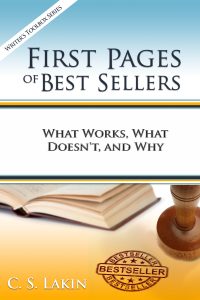 Want to read all the analyses of best-seller first pages on Live Write Thrive?
Want to read all the analyses of best-seller first pages on Live Write Thrive?
Get the compiled collection of posts, along with additional insights and instruction that will help your first pages rock!
First Pages of Best Sellers: What Works, What Doesn’t, and Why is available in Kindle ebook and paperback! Get yours HERE!

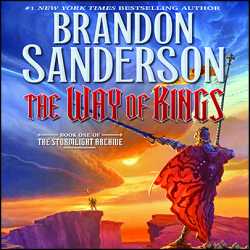

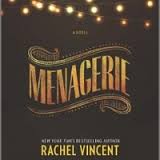
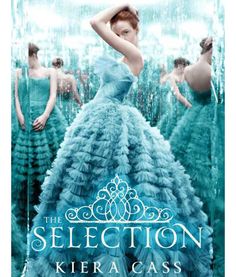
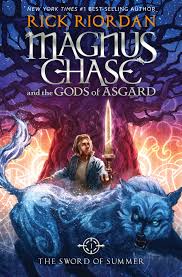






What a wonderful in-depth analysis! I’ve been meaning to start the Stormlight Archive for a while now, and this excerpt has done exactly what a first page should: provided a hook and made me want to read the rest.
I agree about the slight confusion of meaning in ‘When he survived the Desolation, he was supposed to go back as well’, but to be honest, this intrigues me even more rather than putting me off. I want to know where he’s supposed to go back to, and why, and what the Desolation is… So many questions to be answered!
Another great list. Thanks. It’s great fodder to reach for, difficult to obtain.
Well, thanks to this post I’m now hooked on The Way of Kings… I really like how he started this novel, it left a lot of questions that I feel compelled to keep reading to find out answers to. I think I pretty much agree with your analysis of the start, though to be honest, the “that was dangerous” line I didn’t even notice until you mentioned it, now I have no idea what it means. I can’t remember what I first thought it meant, heh.
Anyway, gave me plenty to think about in my writing, so thank you very much for the analysis!
I’m glad to hear it! I haven’t read the book yet. On my list!